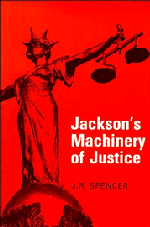Book contents
- Frontmatter
- Contents
- Acknowledgements
- List of figures
- List of tables
- Preface
- Preface to the first edition of ‘The Machinery of Justice in England’
- Abbreviations
- I Historical introduction
- II Civil jurisdiction
- III Tribunals
- IV Criminal jurisdiction
- V The personnel of the law
- VI The European dimension
- VII The cost of the law
- VIII Law Reform
- 42 The process of law reform
- Appendix A The Report of the Civil Justice Review
- Table of Cases cited
- Table of Statutes cited
- Table of Stationery Office publications cited
- Index
42 - The process of law reform
Published online by Cambridge University Press: 10 January 2011
- Frontmatter
- Contents
- Acknowledgements
- List of figures
- List of tables
- Preface
- Preface to the first edition of ‘The Machinery of Justice in England’
- Abbreviations
- I Historical introduction
- II Civil jurisdiction
- III Tribunals
- IV Criminal jurisdiction
- V The personnel of the law
- VI The European dimension
- VII The cost of the law
- VIII Law Reform
- 42 The process of law reform
- Appendix A The Report of the Civil Justice Review
- Table of Cases cited
- Table of Statutes cited
- Table of Stationery Office publications cited
- Index
Summary
There are several aspects of law reform. At the most obvious level, the law may need reforming because it produces results which are contrary to common sense or unfair. This may arise from defects in the substantive law, or defects in procedural law, or both. Substantive law is concerned with rights and wrongs and with the remedies for their violation. Procedural law is concerned with the process by which remedies are made available. Sometimes there is no very clear distinguishing line between substantive and procedural law: thus the definition of a criminal offence, including the maximum punishment prescribed, is substantive law, but whether it is triable summarily or on indictment is procedural. Further, if we consider legal aid, the part of the law that governs eligibility is substantive, yet since the whole purpose is ancillary to bringing or defending cases we think of it as being procedural. However, we must continue to make a distinction because when a part of the law is working badly, different authorities may be responsible depending on whether substantive law or procedure is identified as the source of the trouble. If, for example, some regulations concerning motor vehicles do not seem to be enforced, inquiry may show that the regulations need amending, which is a matter for the Minister of Transport.
- Type
- Chapter
- Information
- Jackson's Machinery of Justice , pp. 493 - 510Publisher: Cambridge University PressPrint publication year: 1989

